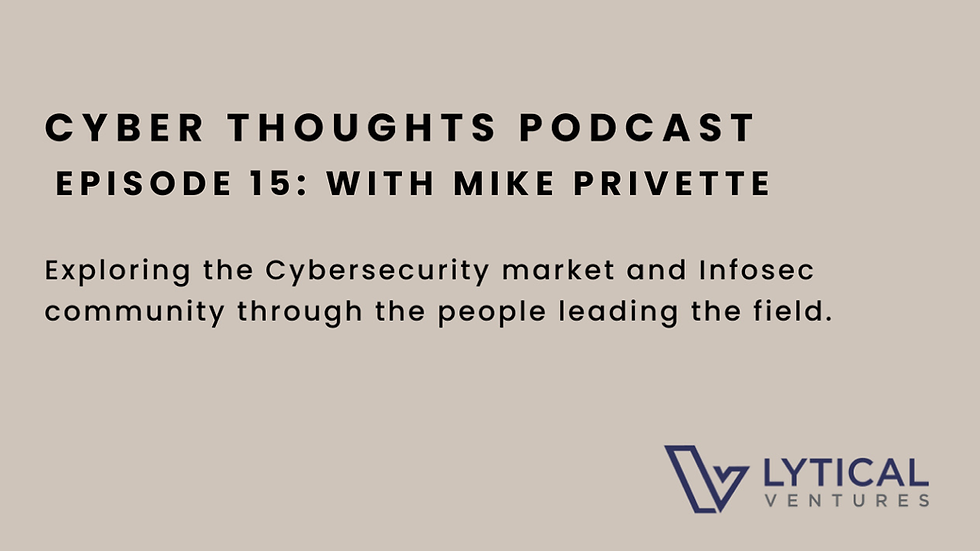Your Data is Garbage; Don’t Bother Protecting It
- Lytical Ventures
- Dec 5, 2023
- 4 min read
Updated: Jan 14, 2025
CYBER THOUGHTS NEWSLETTER
DECEMBER 2023
Your data is garbage and you shouldn’t waste money securing it. That’s a pretty provocative statement, and it came in a closed-door session during Lytical’s annual partner meeting from one of our CISO advisors. More shockingly, it got nods of agreement from the others sitting around the table. Let’s dig in.
The CISO in question wasn’t saying that all of a company's data is low value, just that most of it is, and they spend far too much protecting that data since it’s the “new oil.” The point is simple: Outside some very sensitive data, most of it isn’t worth the cost to protect it. And even more intriguing, sometimes it’s better to lose your data. Wait! What?!?
In prioritizing threats, it came out that a ransomware attack where computers were encrypted and rendered non-functional would cost the company hundreds of millions. On the other hand, a data breach where data was posted to the dark web would only cost the company a few million. In an actual attack, a ransomware group saw the protections against traditional ransomware and opted to go the easier route of data exfiltration. Hence, if the company had spent more on protecting their data, the attackers may have chosen the encryption route and thus cost the company more. Hence, weaker security in one area made good economic sense. Route the attacker to the cheapest outcome.
While we spoke of several wide-ranging topics, from a best-in-class vs. a best-in-suite holistic approach to where 2024 cyber spend will be, this was definitely the spiciest take, and we are happy to share it with you as food for thought.
There was also a massive kerfuffle with Sam Altman, OpenAI, and Microsoft. We would love to tell you all about it, but at the end of the day, we are back to where it started. Our key takeaway was that Microsoft played this right, and the OpenAI board were not serious people. This ended up being a tempest in a teapot, if the teapot is the most important startup of the last decade. Move along, nothing to see here.
Below are a few of the articles that caught our attention this month. Moreover, we’ve inserted one or two sentences in italics, summarizing each article’s importance. We hope you enjoy and appreciate the material.
WHAT WE'RE READING
Here's a curated list of things we found interesting.
Who’s Harry Potter? Making LLMs forget

Researchers at Microsoft successfully got an LLM to completely forget Harry Potter. The implications are massive; it could give governments the ability to keep certain information from their population while still getting the rest of the benefits of LLMs.
Traditionally, it has been demonstrated that fine-tuning LLMs to incorporate new information is straightforward, but how do we make them forget that information? Simply put, unlearning isn’t as straightforward as learning. To analogize, imagine trying to remove specific ingredients from a baked cake—it seems nearly impossible. Fine-tuning can introduce new flavors to the cake, but removing a specific ingredient? That’s a tall order.
Awesome GPTs (Agents) for Cybersecurity

If you want to play with some amazing ChatGPT agents for cybersecurity, or just see what cool things people have created, this is the list for you.
The "Awesome GPTs (Agents) Repo" represents an initial effort to compile a comprehensive list of GPT agents focused on cybersecurity (offensive and defensive), created by the community.
Please note, this repository is a community-driven project and may not list all existing GPT agents in cybersecurity.
Crypto Entrepreneurs Are Pivoting to AI. Here’s One Founder’s Experience.

In case you were wondering what happened to the grifters who jumped into crypto when there was easy funding to be had…
In 2021, at the height of the investor frenzy for crypto startups, entrepreneur Chris Horne raised $2 million in seed funding for Filta, a marketplace on which customers could buy and sell custom non-fungible token face filters that could digitally augment their face, say, by adding cat whiskers or a blockhead. But by the time the company launched in late summer of 2022, enthusiasm for crypto had waned and Filta was faltering. So Horne pivoted to the new hottest sector: artificial intelligence.
TRANSACTIONS
Deals that caught our eye.
Palo Alto has acquired Talon Cyber Security for $625M

This is Palo Alto’s second Israeli security acquisition within a week: Last Tuesday, Palo Alto Networks announced that it was scooping up cloud data specialist Dig Security, for a price that sources close to the deal tell TechCrunch was around $400 million. As with Dig, Talon, a specialist in building enterprise browsers for securing distributed workforce sources, will be integrated with Palo Alto’s Prisma cloud security division.
PODCASTS
What we're listening to.
Sam Altman's Return to OpenAI, Meta's Underage Users, and Guest Alan Patricof

We are big fans of The Pivot Podcast; here Kara and Scott explain the fallout from Sam Altman’s ouster and return.
Kara and Scott discuss Jeff Zucker's return to the news business, and the cost of advertiser backlash in Elon Musk's antisemitism controversy. Then, Sam Altman is back at OpenAI, but who are the winners and losers after all the chaos? Plus, a new complaint reveals what Meta knew about its underage users. Finally, our Friend of Pivot is legendary venture capitalist Alan Patricof. At age 89, Patricof is as active as ever, and he explains why the longevity economy is a smart investment.
ABOUT LYTICAL
Lytical Ventures is a New York City-based venture firm investing in Enterprise Intelligence, comprising cybersecurity, data analytics, and artificial intelligence. Lytical’s professionals have decades of experience in direct investing generally and in Corporate Intelligence specifically.


